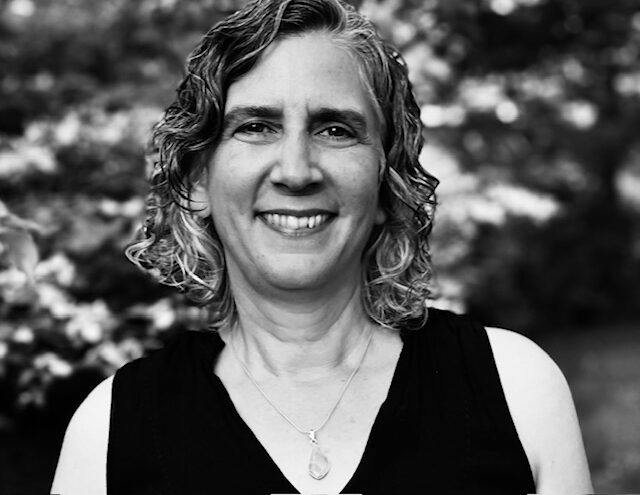Stonecoast Review
The Literary Journal of the Stonecoast MFA
Staff Spotlight
Abigail Bokaer

What do you write?
I write fiction. I’m working on a novel called Tunisian Cowboy, based on my father’s life growing up in North Africa and his passion for the cinema, which formed into a lifelong dream of being a filmmaker.
Is there an author or artist who has most profoundly influenced your work?
My heroes are authors who can make me laugh and cry simultaneously, including Sigrid Nunez, Miriam Toews, and Lorrie Moore.
Why did you choose Stonecoast for your MFA?
I was interested in the low-residency model because of the student-mentor relationship, which offers the opportunity to receive extensive feedback from an author.
What is your favorite Stonecoast memory?
During my first residency workshop, Emily Ezzo, Cait Theroux, and I caught the uncontrollable giggles. I can’t remember what was so funny, but I hadn’t laughed that hard in years. Lifelong friendships were formed from this experience.
What do you hope to accomplish in the future?
I hope to publish my novel. I’ve worked as a public school teacher for over twenty-five years and would love to continue my career as an educator with a focus on writing.
If you could have written one book, story, or poem that already exists, which would you choose?
Drive Your Plow Over the Bones of the Dead, by Olga Tokarczuk.
The following is an excerpt from Abigail’s unpublished novel, Tunisian Cowboy.
We lived on the corner of Santa Monica and Second Avenue in a house with an avocado tree in the front yard that dropped its overripe fruit at our doorstep. The tree’s boughs grew sideways and up like a person holding up their arms, showing off their muscles. Its roots upended the concrete walkway into a maze of hills and crevices covered in splattered fruit. Smooshing the avocados with my bare feet and letting the brown mush ooze between my toes was one of my favorite pastimes and a fun way to get my big sister, Jessica, screaming in disgust. At age four, I wandered the neighborhood on my own, along the palm tree-lined streets, foraging off the bushes, eating a smorgasbord of pink berries and sour grasses. Our house encircled a shared yard with several other dilapidated craftsman homes. These were the last old houses in the neighborhood–condominiums sprawled around us. We were a few blocks from the beach, the Santa Monica Pier, and the Pacific Palisades. In a couple of years, this cluster of houses would be knocked down and replaced with a high-rise. But in 1973, we were the last hippies in the neighborhood.
Pa, Jessica, and I were in the yard playing our favorite game: Baboons. Pa was the papa baboon, and Jessica and I were the mischievous babies. The game started with Pa telling a story, setting the scene, and building up the dramatic tension. “Deep in the forest, the baby baboons are napping while the papa goes down to the river to take a swim.” Fully in character, he moved on his haunches close to the ground, arms hanging long, splashing pretend water on himself, making hooting ape noises as he beat his chest. Jessica and I crouched under a bougainvillea bush, waiting to pounce. We wore long thrift store prairie dresses that covered our entire bodies as we squatted so that we looked like calico sacks with heads sticking out. “And then the papa baboon decides to take a nap in the sun.” He curled onto the ground and broke into a loud snore. We burst out, dresses ballooning around our slight bodies, and hurled ourselves onto Pa’s back. He shrugged us off, sending us plummeting to the ground, calling out, “No backs! No backs!” And we jumped up and dove at his back again and again, only to be tossed to the ground.
As Pa flung me over his shoulder, our landlady, Mrs. Kirby, appeared on her back porch yelling, “Get the hell out of my yard!” Falling and getting the wind knocked out of me felt linked to her presence. I sat up in a state of shock, too stunned to cry. Mrs. Kirby wore cat-eyed glasses, and when she closed her mouth, her jaw shifted forward and back. Her menacing face and tone confused me because the other day, she’d given Jessica and me butterscotch candies, smiled, and told Mom how cute we were. But now she yelled at Pa, “Go back to Mexico where you belong!”
“What the hell are you talking about?” Pa shouted back in his French accent. “I’m from Tunisia! And I live here!” He picked us up, one on each hip and we wrapped our arms over his chest. My sister and I resembled our white American mother. Pa’s brown skin turned darker from working as a gardener in the Los Angeles sunshine.
“I don’t care where you come from–I won’t tolerate child abuse on my property. Now, get out of my yard before I call the police!”
“But we were playing a game. You don’t hassle my wife or the other tenants when they come out here! Why are you getting on my case?” Pa’s volume was a booming roar. “You fucking bitch! How dare you talk to me like that in front of my daughters! I have a degree in film studies from UCLA, and you’re nothing but an ignorant…” And then Pa wasn’t yelling in English anymore–he was swearing in several languages: Arabic, Ladino, French, and Hebrew.
Jessica and I knew Pa’s temper well. There was nothing to do but brace yourself when he flew into a rage. We held on, with hands clutched around his neck as he screamed. It terrified me when people thought Pa was a bad guy. I was worried they’d put him in jail. They didn’t know the real Pa, the one who played wild games with us, spoiled us with love, and cooked delicious food. I felt it my duty to protect him from the outside world and from those who didn’t understand him. But I was little and helpless, so what could I do? I glanced at Jessica, tears rolling down her cheeks, and since my five-year-old sister always knew the right thing to do in every situation, I cried, too. And then, as if in emotional competition, we both sobbed.
